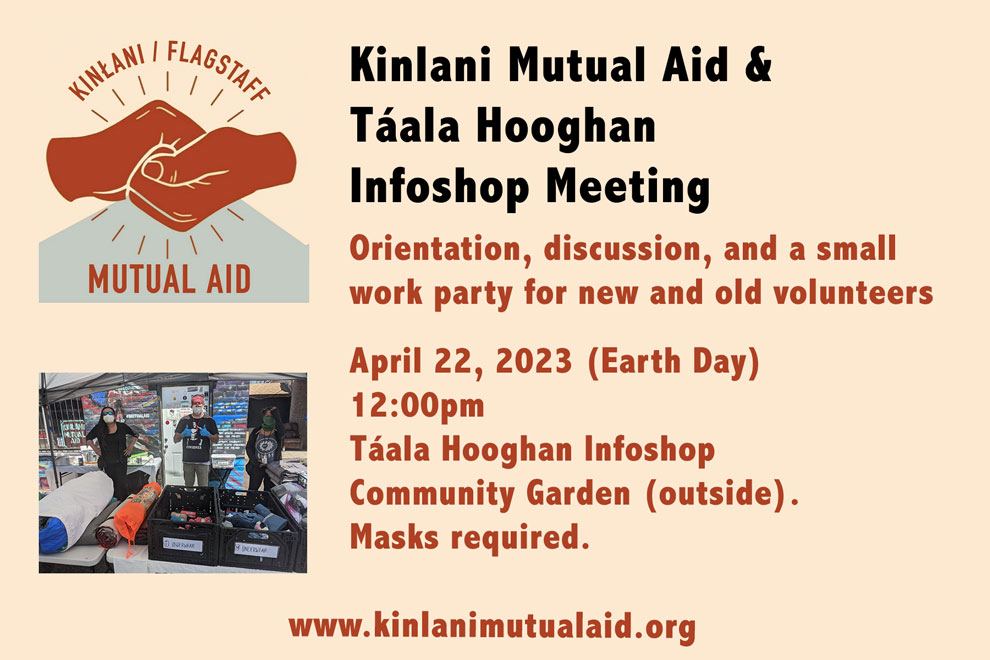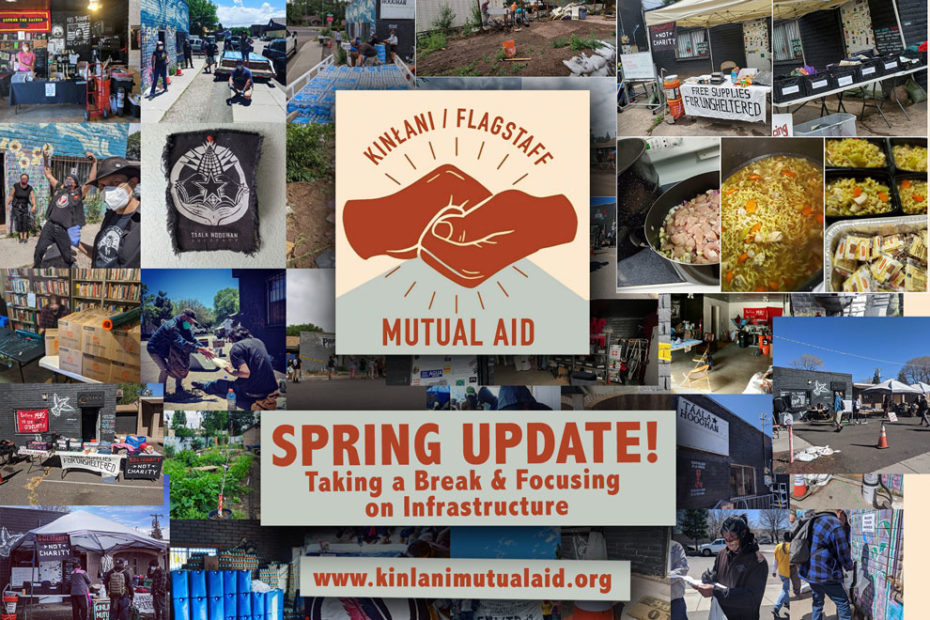 Spring 2023, Occupied Kinłani – In March of 2020 a small autonomous crew of organizers sprung into action to respond to the COVID-19 pandemic, we named this effort Kinłani Mutual Aid. For three years we have focused on intensified Indigenous-led mutual aid support for those most vulnerable in our community and throughout the region. During the pandemic we sourced and distributed truckloads of food, PPE, cleaning supplies, and medicine. We made deliveries of firewood & water to elders living in remote areas. We organized street patrols during harsh winter storms to support unsheltered relatives. When basic supplies for babies and children were hard to find, we found ways to acquire them and get them to those in dire need. We had a well operating process of acquiring supplies (particularly with all the generous donations that came in), sanitizing, and distribution. Volunteers were dropping off medicines and wellness/Covid quarantine supply boxes. We produced nearly 20,000 bottles of hand sanitizer and coordinated distributions for essential items throughout the region. Beyond Kinłani, we sent food & supplies to Hopi, White Mountain Apache, Hualapai, Havasupai, sites throughout New Mexico, even as far as unceded Tohono O’odham territory in Mexico.
Spring 2023, Occupied Kinłani – In March of 2020 a small autonomous crew of organizers sprung into action to respond to the COVID-19 pandemic, we named this effort Kinłani Mutual Aid. For three years we have focused on intensified Indigenous-led mutual aid support for those most vulnerable in our community and throughout the region. During the pandemic we sourced and distributed truckloads of food, PPE, cleaning supplies, and medicine. We made deliveries of firewood & water to elders living in remote areas. We organized street patrols during harsh winter storms to support unsheltered relatives. When basic supplies for babies and children were hard to find, we found ways to acquire them and get them to those in dire need. We had a well operating process of acquiring supplies (particularly with all the generous donations that came in), sanitizing, and distribution. Volunteers were dropping off medicines and wellness/Covid quarantine supply boxes. We produced nearly 20,000 bottles of hand sanitizer and coordinated distributions for essential items throughout the region. Beyond Kinłani, we sent food & supplies to Hopi, White Mountain Apache, Hualapai, Havasupai, sites throughout New Mexico, even as far as unceded Tohono O’odham territory in Mexico.
After unloading countless pallets from shipping trucks we stopped counting. We started seeing others taking inventory and assigning value to their efforts based on numbers and clamoring for media attention. To us, mutual aid has never been about quantity or recognition, but about the relationships and solidarity we build through direct action, not the amount of charity or how much our organizational capacity has grown.
We moved through the pandemic and failures of capitalism with the political assertions of mutuality, direct action, and most critically: our cultural frameworks. We networked with dozens of other mutual aid crews spread throughout the so-called U.S. We coordinated with other Indigenous organizers and groups to form a network called Indigenous Mutual Aid. We also worked locally with the start of Navajo & Hopi Families COVID-19 Relief Fund, Diné Healers Relief Initiative, Masks for the People, Kaibeto Mutual Aid, Defend our Communities, and many others. We further distributed material resources and particularly organized mass distribution of supplies for unsheltered support efforts.
We also faced attacks during the MAGA/fascist/alt-right frenzy that was whipped up during Trump’s reign. We had constant monitoring by cops who parked across the street and other unmarked vehicles. We faced fascists attempting to intimidate us with drive-bys, online threats (that included photos of Táala Hooghan), & spray painted messages on our sidewalks.
In the midst of the George Floyd uprising we also mobilized support and organized actions. When Flagstaff police attacked unsheltered relatives or when they were shut out from a local shelter in snowstorms, we fought back.
As the nature of the pandemic became more understood, testing and vaccines became available, and supply chains stabilized, we also saw the intensity of support (materially and with volunteers) shift as well: from a time when we had more than 100 active volunteers signed up to a time when it was challenging to get 5. We worked to re-configure and sustain autonomy and what some would call a sense of alternate power. We clashed with groups that started profiteering off of mutual aid efforts when they coopted work and pocketed funds. We called on them to support longer term visions of mutuality and autonomy as mutual aid is not something we “move on from” – as non-profit activists move from campaign to campaign as resources shift – mutual aid is something we seek to embody in everything that we do.
We constantly evaluated what we were doing in the immediate and in the long-term to ensure that we were not just responding to the crisis of pandemic, but radically redistributing resources and challenging the ongoing crises of capitalism and colonialism through all of our work.
From planting, harvesting and distributing, there were moments when meals we would share with unsheltered relatives were completely grown from ancestral seeds planted here. These are and still are the moments when our work feels most whole.
We have been frustrated though not deterred by the recuperations of capitalism. During the height of the pandemic, so many experienced how possible it is to live outside of (or really in spite of) capitalism and colonialism and most importantly witnessed its failings and vulnerabilities.
More people have been forced onto the streets.
More people are crowdfunding basic healthcare.
The pressures of surviving in the brutal matrix of economic exploitation have also made it more difficult for volunteers to commit as much as they were able to previously. These are also not unique dynamics facing us, through sharings with other mutual aid projects it’s clear they are facing similar matters.
Though many act like it, the pandemic is not over and we will not ignore the wellbeing of those who are immunocompromised or have other health issues that put them at great risk. As attention from the impacts COVID-19 had on Diné Bikéyah (Navajo Nation) have shifted, we still are assisting families without electricity and running water with support requests. We are still receiving reports of whole families severely stricken by the virus. The pandemic is not over until disabled, immunocompromised, and our medicine practitioners say it is.
This brings us to our break.
One thing that our collective comes back to is how necessary Táala Hooghan Infoshop was/is as infrastructure to directly mobilize a well scaled response to the pandemic. This organizing would not have been possible without this autonomous space.
There are many repairs that Táala Hooghan Infoshop is in dire need of and other improvements that we initiated both before and during the pandemic that must be tended to.
We started work on a community kitchen and have only about 20% of that project done.
We have some basic construction repairs that are badly needed (both inside and out) and ideas for a new larger bathroom where the old kitchen currently is.
We have to tend to old broken windows, exterior painting, and the garden area as well as replace all the fencing and gates. We would like to install solar panels and move farther off grid.
And so our break (which is not really a break) will be a shift of focus from general distribution to infrastructure projects.
We still intend on distributing necessary supplies for those making direct requests and unsheltered relatives during this pause, but our primary focus will be on the space.
We intend to open parts of the space to community again soon, but for now it is only open to volunteers who are oriented with our health protocols. Our protocols still stand as infection rates are still high and people are still dying from this virus.
We will be taking down our request form from the website and FB group though we will still respond to direct requests for support.
Through this process we intend to strengthen what we do as a mutual aid project but as we’ve stated in other communications, we do not wish to be the “mutual aid org” specialists as we believe that mutual aid is what we should all be doing everyday in our lives.
Táala Hooghan Infoshop started in 2007 (16 years!) as a radical resource center and has continued to shift, grow, and be a site to wage conflict against systems of oppression. The space also maintains its roots and works with Indigenous Action as a foundation for its direction.
We invite you to connect, volunteer, and support our efforts as we shift, focus, fix some things and break others. So pardon our dust, broken concrete, and dirt beneath our fingernails.
We will have a KMA & Táala Hooghan Infoshop meeting with orientation, discussion, and a small work party for new and old volunteers on April 22, 2023 (Earth Day) at 12:00pm outside in our garden. Masks required.
Ahe’ hee’ nitsaago,
– KMA crew
Email us any questions or to volunteer here: kinlanimutualaid@protonmail.com
Donate to our Venmo or Indigenous Action’s PayPal:
Venmo @kinlanimutualaid
Paypal: https://www.paypal.com/paypalme/indigenousaction
Facebook Group: https://www.facebook.com/groups/flgmutualaid/
Website: www.kinlanimutualaid.org
